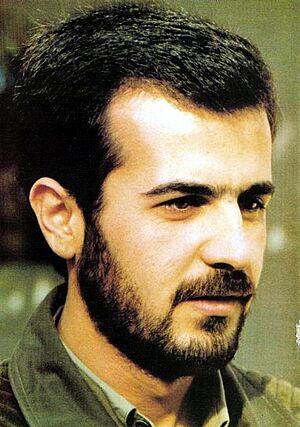Bassel al-Assad facts for kids
Quick facts for kids
Bassel al-Assad
بَاسِلُ ٱلْأَسَدِ |
|
|---|---|

Bassel al-Assad, c. 1992
|
|
| Native name |
بَاسِلُ ٱلْأَسَدِ
|
| Nickname(s) | The Golden Knight |
| Born | 23 March 1962 Damascus, Syria |
| Died | 21 January 1994 (aged 31) Damascus, Syria |
| Allegiance | |
| Service/ |
|
| Years of service | 1980–1994 |
| Rank | Colonel |
| Unit | |
| Commands held | 42nd Special Forces Regiment 12th Armoured Battalion, Syrian Arab Republican Guard. |
| Awards | Hero of the Republic Order of Salahaddin |
| Relations | al-Assad family |
Bassel al-Assad (Arabic: بَاسِلُ ٱلْأَسَدِ, romanized: Bāsil al-ʾAsad; 23 March 1962 – 21 January 1994) was a Syrian engineer, soldier, and politician. He was the oldest son of Syrian President Hafez al-Assad. He was also the older brother of Bashar al-Assad, who later became president. Many people thought Bassel would become president after his father. However, he sadly died in a car crash in 1994.
Contents
Early Life and Education
Bassel al-Assad was born on 23 March 1962. He studied to become a civil engineer. He also earned a special degree in military sciences.
He once shared a bit about his childhood. He said that his father was very busy. Sometimes, days would pass without them talking much. They rarely ate meals together as a family.
Military Career and Public Role
Bassel was trained in parachuting and joined the Special Forces. Later, he moved to the armoured corps. He received training at military academies in the Soviet Union. He quickly rose through the ranks in the Syrian army. He became a major and then led a brigade in the Republican Guard.
In 1987, Bassel became well-known across the country. He won several medals in horse riding at a regional competition. Syrian newspapers called him "The Golden Knight" because he was so good with horses. He also enjoyed fast cars. His friends described him as a strong and charming leader.
Bassel was soon put in charge of Presidential Security. In 1989, he also started the Syrian Computer Society. His brother, Bashar, later took over this society.
Path to Leadership
After his father, Hafez al-Assad, recovered from a serious illness in 1984, Bassel started to appear more often with him. Bassel was being prepared to take over as president. His father worked hard to make Bassel the next leader in the early 1990s.
After his father won the election in 1991, people publicly called the President "Abu Basil." This means "Father of Bassel." Bassel also met with leaders from Europe and Arab countries. He was good friends with the children of King Hussein of Jordan. He also met King Fahd of Saudi Arabia.
Bassel played an important part in matters concerning Lebanon. He was known to many Lebanese leaders. He also started a public campaign to fight corruption in the government. He often wore his military uniform at official events. This showed the government's strong support for the armed forces.
Death and Legacy
On 21 January 1994, Bassel al-Assad was driving his luxury car very fast. It was early in the morning and foggy. He was on his way to the airport for a ski vacation. He crashed into a barrier and died instantly. He was not wearing a seatbelt.
Bassel's body was taken to a hospital and then buried in Qardaha, Syria. His father was also later buried there.
After his death, shops, schools, and public offices in Syria closed down. The country honored him as "the martyr of the country" and "the symbol for its youth."
Many places were named after him. These include squares, streets, a swimming complex, hospitals, and sports clubs. The international airport in Latakia was named Bassel Al-Assad International Airport. Statues of him can be found in several Syrian cities. Even after his death, his picture often appears on billboards with his father and brother.
In 2020, a museum dedicated to Bassel was opened in Latakia.
Bassel's death changed the future of Syria. His younger brother, Bashar al-Assad, was studying to become an eye doctor in London. After Bassel's death, Bashar was called back to Syria. He then became the person expected to be the next president. Bashar became President after his father died on 10 June 2000.
 | Bayard Rustin |
 | Jeannette Carter |
 | Jeremiah A. Brown |

